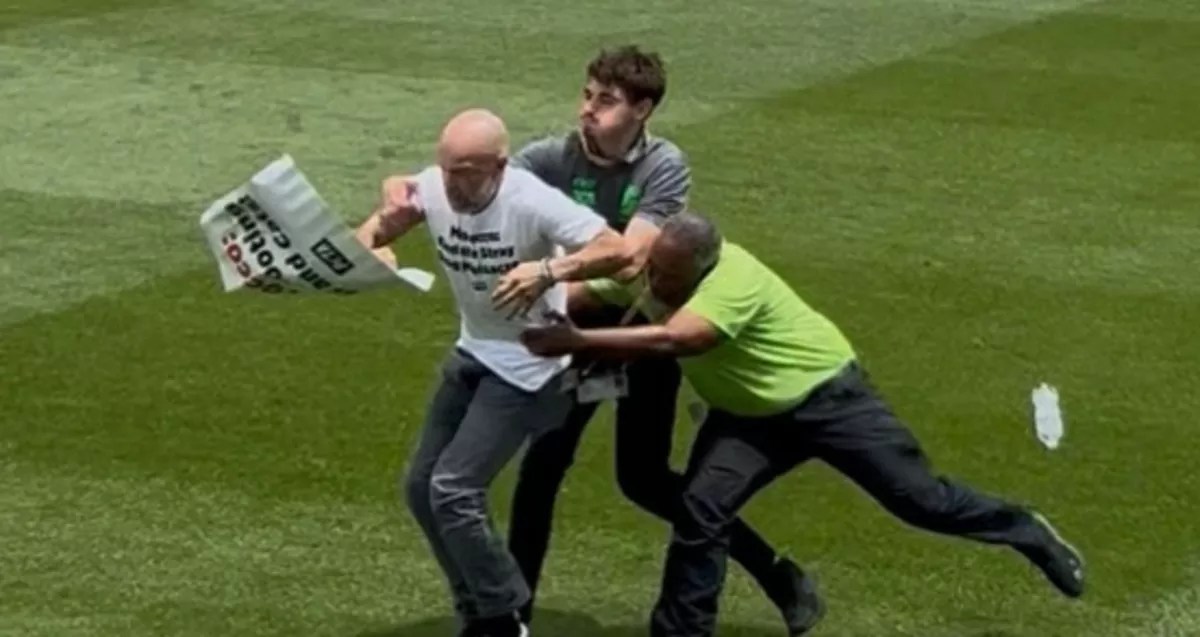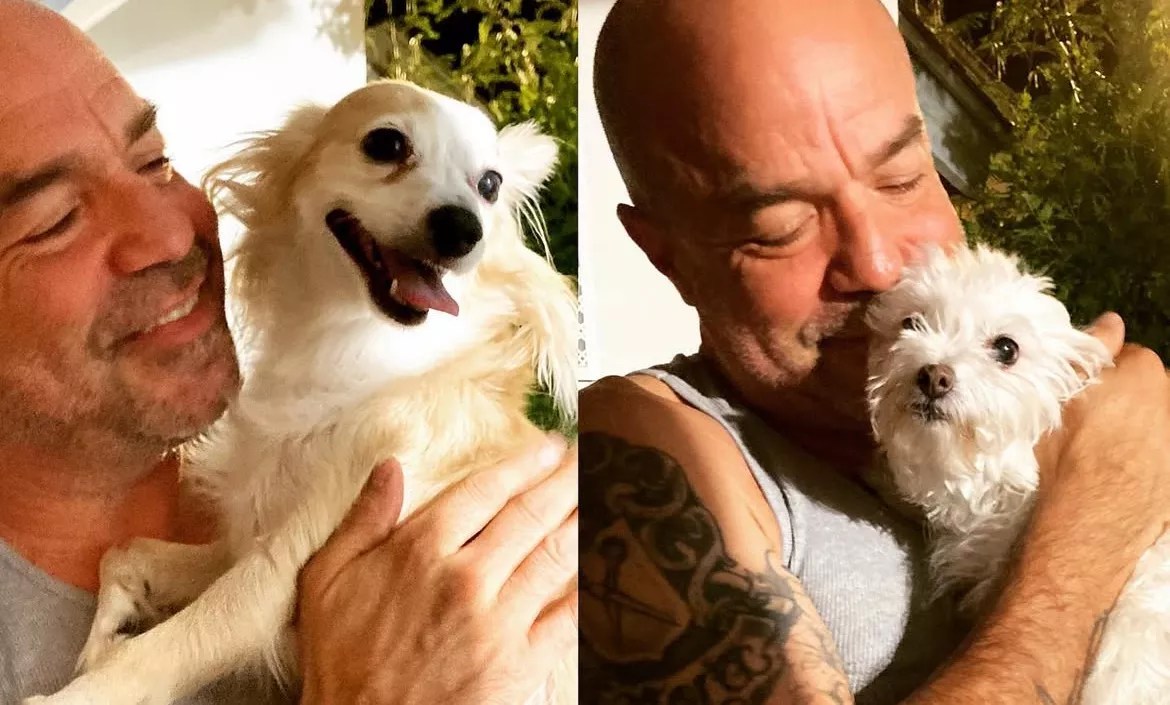
PETA

Audio By Carbonatix
You may have seen them on social media: dozens of videos of Moroccan government officials netting, poisoning, and shooting stray animals and then leaving them to die in the streets.
That’s how some cities in Morocco are “cleaning up” public areas prior to the 2030 FIFA World Cup, which will take place in six of its biggest cities. The videos have caused an outcry from animal welfare activists, who are calling on the North African nation to halt the practice and abide by a trap-neuter-vaccinate-release program it’s supposed to have been using for years.
One such person is Johnny Mora, a 51-year-old Mesa resident and self-proclaimed animal lover who works as an acquisition specialist for the RV dealer Camping World. Mora grew uncomfortably familiar with Morocco’s mistreatment of local cats and dogs via Instagram clips and online news sources.
“There are constant reports of (Moroccan government officials) poisoning animals on the streets, trapping them in cages, leaving them to starve, and in many cases, burning them alive,” he told Phoenix New Times. “I think the one that caught me was a scene where the families were at a beach. They were just relaxing, you know, how you or I would with our families, but there was a dog literally foaming from the mouth and convulsing within that camera shot. I mean, even if you’re not an animal lover, that’s inhumane.”
So, he decided to speak out about it. Or, more accurately, run out about it.
Earlier this month, Mora and a friend – who declined to be named and who does not live in Arizona – traveled to Philadelphia, which hosted a FIFA Club World Cup soccer match between England’s Manchester City and Morocco’s Wydad on June 18. The pair brought signs that said, “Morocco: Stop shooting dogs and cats,” and wore shirts reading, “Morocco: End the stray dog massacre,” hiding both under outer layers of clothing to sneak them by security at Lincoln Financial Field.
But flashing a sign or donning a protest shirt in a crowd of tens of thousands is hardly a way to get noticed. Mora and his friend were going to storm the field.
“It was a no-brainer,” Mora said.
Mora’s friend was the first to take the plunge. After a goal, he removed his outer layer and jumped the boundary between the stands and the field. He managed to weave between players with his sign held high for roughly 20 seconds before being tackled by security.
During halftime, Mora repeated the demonstration. Perhaps predictably, he didn’t last as long. “My jump was short-lived,” Mora said. “I pulled out my sign and lifted it above my head, and right about the time I had it out, I was tackled.” But Mora’s removal from the pitch had an unforeseen benefit.
“They walked me behind the goalkeeper on the Morocco side,” he said. “So as I was walking with security, easily a thousand people were looking down at me. And I’m sure there was confusion there – like, ‘What the hell are you doing? Morocco, dogs, what?’ But then you could see everyone’s face change. People started giving me thumbs up, touching their heart, doing heart signs.”

Johnny Mora said he’s helped find homes for 30 dogs in the past five years.
Courtesy of Johnny Mora
The aftermath
Mora said stadium security kept him in a holding cell until the Philadelphia Police Department could transport him and his friend to the municipal jail, where both men were booked and placed in the same cell. Mora’s friend saw a judge and was released a day later, but Mora said he didn’t meet with a judge until the day after that. (In Pennsylvania, a person can be held for up to 72 hours before being arraigned.) He was charged with four misdemeanors: trespassing, two counts of disorderly conduct, and “disrupting meetings.”
Mora said the jail’s air conditioning was “kept intentionally at an abnormal level,” making his cell uncomfortably warm. Mora also said he was repeatedly given cheese sandwiches despite insisting he was allergic to dairy.
The Philadelphia Police Department did not respond to a request for comment on Mora’s claims.
Some animal welfare organizations have celebrated Mora’s protest, including People for the Ethical Treatment of Animals. “Dogs are being burned alive, poisoned, and dragged by the neck, crammed into cages, and left to die without food or water. Sometimes, interrupting a soccer game is what it takes to draw critical attention to this issue,” PETA public relations coordinator Sara Groves told New Times in an email. “PETA is calling on the Moroccan government to put an immediate stop to the horrifically cruel slaughter of dogs… and we are asking FIFA to use its influence to help make that happen.”
PETA played a role in Mora’s protest. Groves said PETA organized the protest and paid for the sign and shirts Mora and his friend wore, working “with Mora and other concerned animal advocates to protest Morocco slaughtering dogs and cats at the game.” Mora chose to run onto the field of his own accord, Groves said, which Mora confirmed. Mora told the Arizona Republic that PETA – which sent out a press release about his protest and offered to arrange interviews with him – did not financially compensate him for the protest or pay for any of his travel expenses.
But if PETA was surprised by Mora’s decision to storm the field, it shouldn’t have been. He’s done that before.
According to the Republic, Mora ran onto the field during a Copa America match at Glendale’s State Farm Stadium in June 2024 to protest against bullfighting in Mexico. Mora told the paper that he was cited but that his case was not pursued further. Mora told New Times he has also engaged in several peaceful public demonstrations with a local group called the Arizona Animal Liberationists, like handing out vegan cookies and chalking “messages of compassion” onto the sidewalks at Tempe Beach Park.
He cares for all animals, but Mora said dogs “have a special place” in his heart. He and several of his closest family members own small dogs, and Mora said he’s helped find homes for 30 dogs in the past five years.
That’s why he ran onto the field in Philadelphia, where he faces a July 1 status hearing in his case. He wants to turn up the heat on Morocco in the hopes that they’re pressured to stop the slaughter.
“I want people to say to Morocco, ‘Hey, what’s this thing about you guys killing dogs?'” Mora said. “I want to see the government squirming in its seat.”